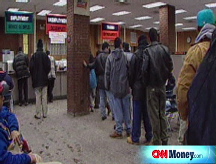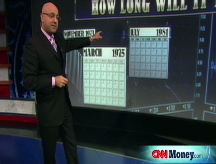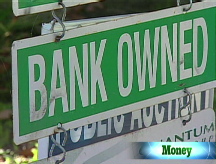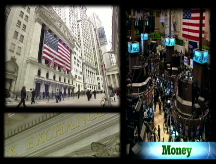Stocks gain for 2nd session
Wall Street manages to advance in a volatile session as investors try to look beyond weak economic news.

NEW YORK (CNNMoney.com) -- Stocks rallied Wednesday, finding momentum at the end of a volatile session in which investors considered a rash of weak economic reports but opted to scoop up select stocks anyway.
The Dow Jones industrial average (INDU) gained 2%. The Standard & Poor's 500 (SPX) index rose 2.6% and the Nasdaq composite (COMP) gained 2.9%.
Stocks seesawed throughout the day as investors considered the day's rash of poor economic news, including weak readings on the labor market ahead of Friday's big report.
Stocks surged in the last two hours of the session, after the Federal Reserve released its "Beige Book" survey of the economy. The report showed a deterioration in all 12 of the Fed's districts, as had been expected.
Despite the day's bad news and some jitters about Friday's employment report, stocks managed gains.
"The market is trying to find its footing," said Timothy Ghriskey, chief investment officer at Solaris Asset Management.
"Historically, one characteristic of a market bottom is when stocks rally despite bad news," Ghriskey said. "We haven't see that kind of big rally yet, but we have seen some stabilization."
Ghriskey said that year-end maneuvering by portfolio managers and individuals could send stocks lower again in a few weeks, but that ahead of that, there's room for more gains.
Thursday brings November sales reports from the nation's chain stores, including the figures from "Black Friday" and the Thanksgiving weekend. Weekly unemployment claims and the October factory orders report are also due.
"We're not expecting good news on the economy and we haven't been getting any," said Bill Flaig, chief investment officer at Arrow Funds. "The reports keep coming in a little weaker than expected, but not dramatically."
The market is in the process of trying to fully anticipate how bad the economic news is, he said. Until that happens, stocks will remain vulnerable to big declines.
"We could still get a bounce through year-end or early January," he said. "However, if that is the case, it will be a bear-market bounce. After that, the reports are going to get worse and that could cause another leg down."
Stocks rallied Tuesday on indications that the automakers might get a bailout after all. GE also helped sentiment after it said it will keep its dividend intact and work to sustain its top-tier debt rating despite the poor economy. Tuesday's run sent all three major gauges up by at least 3%.
Economy: Weak readings on the labor market were released Wednesday morning, adding to bets that Friday's big national employment report will be pretty dismal.
Private-sector employers cut 250,000 jobs from their payrolls in November, according to a report from payroll processing firm ADP. That was worse than the 205,000 economists were expecting. Employers cut a revised 179,000 jobs from their payrolls in October.
Planned job cuts in November hit the highest level in seven years, according to a survey from outplacement firm Challenger, Gray & Christmas. Job cut announcements jumped to nearly 182,000 in November, up 61% from October and up a whopping 148% from a year ago.
Another report showed that the service sector weakened considerably in November, falling to 37.3 from 44.4 in October. The figure was worse than analysts' forecast for a reading of 42, and reflected a drop in new orders, prices and employment.
An additional report showed that third-quarter non-farm productivity was revised higher to an increase of 1.3% from an initial read of 1.1%. That was more than the 0.9% increase economists were expecting, but down from the 3.6% figure in the previous quarter.
In other news, President-elect Barack Obama has named New Mexico Gov. Bill Richardson as his choice for Commerce secretary.
Company news: BlackBerry-maker Research in Motion (RIMM) warned third-quarter sales and earnings won't meet previous forecasts due to the stronger dollar hurting international sales and the weaker economy hurting U.S. growth.
Marvell Technology (MRVL) swung to a profit in the third quarter from a loss last year, earnings 23 cents per share, versus forecasts for 21 cents a share. The chipmaker issued a current-quarter revenue forecast in a range that could miss analysts' estimates. But investors focused on the positive and shares rallied 20%.
Freeport-McMoRan Copper & Gold (FCX, Fortune 500) suspended dividend payments, lowered its 2009 capital expenditures budget and said it will cut copper production over the next two years. The copper producer said the global recession is hurting metal demand and pricing. Shares fell 17% in active NYSE trading.
Retailers jumped after comScore said Cyber Monday sales jumped 15% from a year ago as investors took advantage of deep online discounts. Amazon.com (AMZN, Fortune 500), Home Depot (HD, Fortune 500), Lowe's (LOW, Fortune 500), Target (TGT, Fortune 500) and Best Buy (BBY, Fortune 500) were among the big gainers.
Big bank stocks gained, including Dow components American Express (AXP, Fortune 500), JP Morgan Chase (JPM, Fortune 500), Bank of America (BAC, Fortune 500) and Citigroup (C, Fortune 500).
Market breadth was positive. On the New York Stock Exchange, winners beat losers two to one on volume of 1.55 billion shares. On the Nasdaq, decliners beat advancers four to three on volume of 2.3 billion shares.
Automakers: The United Auto Workers said Wednesday it will work with the Big Three to bring down costs, improving their chances of getting a government bailout. (Full story)
On Tuesday, GM (GM, Fortune 500), Ford Motor (F, Fortune 500) and Chrysler submitted their turnaround plans to Congress. the automakers are now asking for a combined $34 billion versus the initially requested $25 billion. GM's haul, at $18 billion, is the biggest. Chrysler is asking for $7 billion. Ford asked for $9 billion as a stop-gap measure, saying it has enough money to get through 2009 and expects to be profitable again by 2011.
The Senate Banking Committee is scheduled to hold a hearing on the bailout Thursday, while the House Financial Services Committee is holding its hearing Friday.
Separately, the automakers also released abysmal November sales results.
Bonds: Treasury prices inched higher, with the yield on the benchmark 10-year note falling to 2.67% from 2.68% late Tuesday. The 10-year yield dipped below 3% last week for the first time since the note was first issued in 1962.
Treasury prices and yields move in opposite directions.
The yield on the 3-month Treasury bill fell to 0.01% from 0.04% Tuesday, near a 68-year low of zero hit last month. The 3-month is seen as the safest place to put money in the short term. A low yield means wary investors would rather preserve cash despite earning little or no interest on it than risk the stock market.
Lending rates eased. The 3-month Libor rate slipped to 2.20% from 2.21% Tuesday, while overnight Libor fell to 0.88% from 1% Tuesday, according to Bloomberg. Libor is a key bank lending rate.
Other markets: The dollar gained versus the yen and fell against the euro.
U.S. light crude oil for January delivery fell 17 cents to settle at $46.79 a barrel on the New York Mercantile Exchange, after the government reported a surprise decline in oil inventories last week. Crude prices ended Tuesday's session at a 3-1/2 year low.
COMEX gold for February delivery fell $12.80 to $770.50 an ounce.
Gasoline continued the fall to nearly four-year lows, with prices down nine-tenths of a cent to a national average of $1.803 a gallon, according to a survey of credit-card swipes released Wednesday by motorist group AAA. Prices have been sliding for 2-1/2 months, and have dropped more than $2 a gallon or 53%.
In global trading, Asian and European markets ended higher. ![]()





